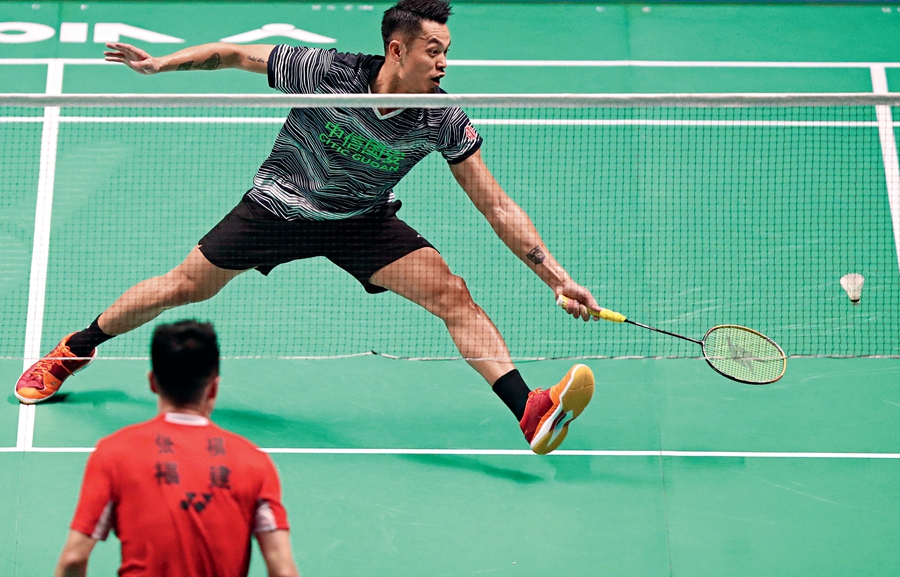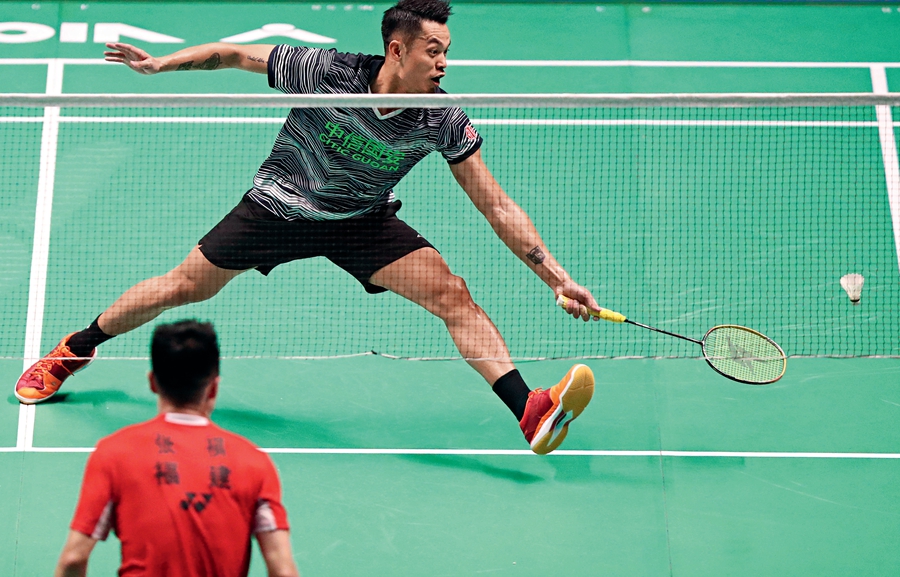Badminton: A China Dominated Sport
China Today by Degen Hill,April 20, 2018 Adjust font size:
Badminton, the sport you weren’t quite sure how to spell, was first developed in the mid-19th century in British India, then called “poona,” and is one of the most played sports in the world, with an estimated 220 million people playing badminton regularly. The name is derived from Badminton House in Gloucestershire, where the sport was commonly played by the guests of the Duke of Beaufort. Badminton has become one of China’s favorite sports with thousands of amateur leagues throughout the country. The world’s most populous nation has also come to be the greatest force in both men’s and women’s badminton competition recently.

Lin Dan is one of the best badminton players in China.
Badminton is a racquet sport played using racquets to hit a shuttlecock across a net. A shuttlecock, despite its funny name, is a high-drag projectile in a cone shape, formed from 16 overlapping feathers embedded into a rounded cork base. The cork is covered with thin leather or synthetic material. The point of the game is to hit the shuttlecock over the net before it hits the ground, with each game played to 21 points. The idea is simple enough, but there is huge amount of technique and skill involved. A few basic moves include lift, block, drive, smash, slicing, lob, and serve. Competitions include men and women’s single, as well as doubles, and mixed doubles. While most of us will never be professional badminton players, learning the basic moves can allow for many fun and exciting games among friends.
China’s Badminton Dominance
There is no question that China is the current dominating badminton champion. The first Chinese provincial badminton team was established in Southeast China’s Fujian Province in 1956, and the first Chinese badminton team formed in 1963, which was suspended for some years during the “cultural revolution” (1966-1976) and resumed in 1973. The players trained hard and their skills improved quickly. In 1978, China was among 21 other nations and regions to first join the World Badminton Federation, now known as the Badminton World Federation (BWF). Since the BWF began formal competitions in 1982, China has consistently won good scores in various international competitions. The Chinese badminton team reached its height in the 1980s, winning all five gold medals at the Fifth World Badminton Championships in 1987 and the Badminton World Cup in 1988. With the sport gaining accreditation as an Olympic event in 1992, badminton was propelled on to the world stage and helped boost its global appeal, with China soon proving why it deserved to be the sport’s leader. China is one of the most successful badminton teams in history, having won the Thomas Cup (men’s team championship) nine times and the Uber Cup (women’s team championship) 13 times. China has also won more medals in badminton at the Olympics than any other country.
One of China’s most recognizable badminton players is Lin Dan. By the age of 28, Lin had completed the “Super Grand Slam,” having won all nine major titles in the badminton world, and he is the only player in badminton history to have won two-time Olympic champion and five-time World Champions. Alongside him is Zhang Ning, one of the best woman badminton players in the history of the sport. Her accomplishments include being the only female player to win consecutive Olympic singles gold medals in 2004 and 2008. China’s love and dominance in the sport can be attributed to three factors. First is support from the government. The Chinese government provides a majority of the funding for the Chinese national team, including training and financial upkeep of the players throughout the year. This allows them to focus solely on the sport without the stress of financial burdens. Second is China’s well-established badminton program, which allows the sport to find solid players from around the country for its national team and ensures that badminton maintains its success and popularity throughout the country. For example, Zhang Ning, the best ever woman player, started her professional training at the age of 11 and became a national team member at 16. However, she got the opportunity to represent the nation to attend the Olympics at 29, through years of fierce competition with her excellent fellow team members. “I even officially asked for retirement to my coach in 2001 when I was 26,” she recalled, “It was just because of love for this game that I went through highly-intensive training, torturing physical injuries, and desperate longing for winning.”
Finally, there is a huge talent pool of skilled badminton players in China. Badminton is a non-contact game that has been played for decades by children in schools and colleges throughout the country. As such, China has been able to translate this youthful love for the game into a dedicated group of men and women who compete internationally at the highest level, allowing China to dominate the sport in international and regional events.
Health Benefits
When thinking of badminton, many people wouldn’t think of it as an athletic sport. However, badminton has numerous health benefits to those who play. As an aerobic sport, players are continually running around the court, requiring them to be agile, strong, and have good stamina. Using the racquet also requires the player to have good motor coordination. The BWF claims, “Badminton offers multiple health benefits and promotes longevity in older people.” While many people don’t play badminton competitively, taking part in sports that involve competition can help players increase their self-esteem, self-confidence, motivation, and helps reduce stress and depression.
In China, during spring and summer, many children, parents, and grandparents can be seen playing badminton within their apartment complex and in local parks. Often, the sport is played inside, on a professional court, which looks similar to a tennis court, except for a higher net. Many gymnasiums have badminton courts with several nets, allowing a number of players to play games at the same time. However, when the weather is nice, many people simply choose to hit the shuttlecock back and forth outside, without the use of the net. The sport is a great way to relax from the pressures of the day and connect with friends and family. It seems that no matter at what level badminton is played, the sport continues to be popular in China.

